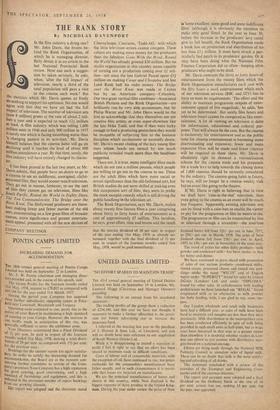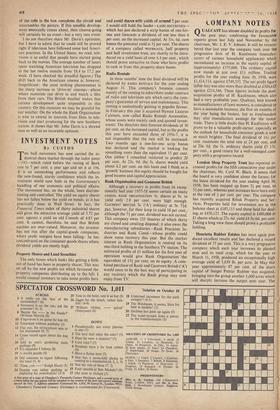THE RANK STORY
By NICHOLAS DAVENPORT Ts the film industry a dying one? Mr. John Davis, the brains be- hind the Rank Organisation, of which he is managing director, flatly denies it in an article in the last National Provincial Bank review. How can such a sugges- tion be taken seriously, he asks, when, 'after the full impact' of television, nearly a third of the total population still pays a visit
to the cinema each week? But the statistics which Mr. Davis quotes so freely do nothing to support his optimism. No one would agree with him that we have yet had 'the full impact: of television. The number of television sets (now 8 million) grows at the rate of about 2 mil- hoti a year and is expected to reach 124 million at least. A film industry which was selling 1,600 million seats in 1946 and only 900 million in 1957 Is surely one which is facing something worse than `a changing pattern in its activities.' Mr. Davis himself believes that the cinema habit will go on declining until it reaches the level of about 600 million attendances a year. By that time, surely, the film industry will have entirely changed its charac- ter, It has been proved in the last two years, as Mr. Davis admits, that people have no desire to go to a cinema to see an indifferent, unoriginal, cliche- saturated film; they would sooner watch television. They go out in masses, however, to see the sort of film they cannot get on television, films like 8°141h Pacific, Round the World in Eighty Days, The Ten Commandments, The Bridge over the Roc,. Kwai. The Hollywood producers are there- fore making fewer and fewer movies of the old sort, concentrating on a few great films of broader canvas, more significance and greater entertain- ment appeal, presented with all the new devices of CinemaScope, Cinerama, `Todd-A0,' with which the little television screen cannot compete. These colossi are making more money for the producers than the fabulous Gone With the Wind. Round the World has already grossed $30 million. But no studio organisation in this country seems capable of turning out a production costing over £1 mil- lion—not since the late Gabriel Pascal spent million on making Ciesar and Cleopatra and lost Lord Rank half his stake money. The Bridge over the River Kwai was made in Ceylon but by an American company—Columbia. Our two great vertical film combines—Associated British Pictures and the Rank Organisation—are brilliantly run by very able accountants,•but Sir Philip Warter and Mr. John Davis would be the first to acknowledge that they themselves are not creative film artists, or even super-showmen like the late Mike Todd, and that if they were lucky enough to find a producing genius here they would be incapable of subjecting him to the business discipline which accountants so naturally desire. Mr. Davis's recent chiding of the lazy young film stars whose heads are turned by too much publicity revealed much more than the headlines suggested.
There are, it is true, many intelligent films made which do not cost a million pounds, which people are willing to go out to the cinema to see. These are the adult films which have more social or sexual significance than. the old-fashioned sort, but British studios do not seem skilled at making even this inexpensive sort of film; they seem to prefer the stock escapist comedy which is still driving the public headlong to the television set.
The Rank Organisation,. says Mr. Davis, makes about twenty first-feature films a year comprising about thirty to forty hours of entertainment at a cost of approximately £5 million. This involves, he says, great effort, time and brains and the result
is 'some excellent, some good and some indifferent films' (although it is obviously the intention to make only good films). In the year to June 30, before the increase in the producers' levy could give its full benefit, the Rank Organisation made a book loss on production and distribution of no less than LI I million. It must have struck a par- ticularly bad patch in its producers' garden. Or it may have been doing what the National Film Finance Corporation did so often—keeping alive producers who ought to be dead. Mr. Davis contrasts the thirty to forty hours of entertainment from the twenty films which the Rank Organisation manufactures each year with the fifty hours a week entertainment which each of our television services (BBC and ITV) has to have to meet its requirements. 'The effort and the ability to maintain programme outputs of enter- tainment appeal of this magnitude,' he adds, 'has yet to be determined.' But surely film hours and television hours cannot be compared as like enter- tainment. A lot of viewing on television is done for information, educational and cultural pur- poses. That will always be the case. But the cinema is exclusively for entertainment and as the public taste for cinema entertainment is becoming more discriminating and expensive, fewer and more expensive films will be made and fewer cinemas will be required to show them. Mr. Davis is absolutely right to demand a rationalisation scheme for the cinema trade and his proposals for a trade levy to help towards the closing down of 1,000 cinemas should be seriously considered by the industry. The cinema-going habit in future, he says, will no longer be a routine weekly visit but an event like going to the theatre.
If Mr. Davis is right in believing that in time we shall have 'coin-in-the-slot' television, then even going to the cinema as an event will be much less frequent. Apparently existing television sets can be fitted with a coin-box to enable the viewer to pay for the programme or film he wants to see. The programme or film can be transmitted by line or televised through a scrambler—the insertion
of the coin in the box completes the circuit and unscrambles the picture. If this sensible develop- ment eventually comes about, then cinema-going will certainly be arj event-but a very rare event.
I do not therefore share Mr. Davis's optimism, but I have to admit that he could still be proved right if television here followed some bad Ameri- can practices. In the United States, we read, tele- vision is so awful that people have started going back to the movies. The average number of hours spent watching American television has dropped in the last twelve months from 18.4 to 17.2 per week. (I have checked the dreadful figures.) The drift back to the American cinema is, however, insignificant : the most striking phenomenon is the sharp increase in 'drive-in' cinemas-places where motorists can drive in and watch a film from their cars. The British weather makes that curious development quite impossible in this country. On this occasion we may be grateful for our weather. On the whole the Rank Organisation is wise to extend its interests from films to tele- vision and start producing for the new Southern station. It shows that Mr. John Dayis is a shrewd man as well as an incurable optimist.



































 Previous page
Previous page